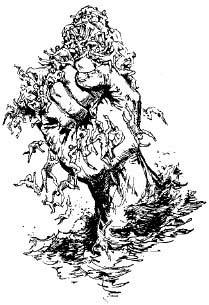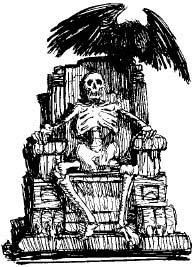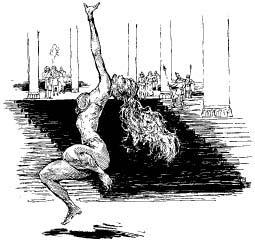The Savage Tales of Solomon Kane (23 page)
Read The Savage Tales of Solomon Kane Online
Authors: Robert E. Howard,Gary Gianni

“The sons of Atlantis had brought their black slaves into the city with them. The rulers were warriors, scholars, priests, artizans; they did no menial work. For that they depended upon the slaves. There were more of these slaves than there were masters. And they increased while the brown people dwindled.
“They mixed with each other more and more as the race degenerated until at last only the priestcraft was free of the taint of black blood. Rulers sat on the throne of Negari who were nearly pure negro, and these allowed more and more wild tribesmen to enter the city in the guise of servants, mercenaries and friends.
“Then came a day when these fierce slaves revolted and slew all who bore a trace of brown blood, except the priests and their families. These they imprisoned as ‘fetish people.' For a thousand years black men have ruled in Negari, their kings guided by the captive brown priests, who though prisoners, were yet the masters of kings.”
Kane listened enthralled. To his imaginative mind, the tale burned and lived with strange fire from cosmic time and space.
“After all the sons of Atlantis, save the priests, were dead, there rose a great black king on the defiled throne of ancient Negari. He was a tiger and his warriors were like leopards. They called themselves Negari, ravishing even the name of their former masters, and none could stand before them. They swept the land from sea to sea, and the smoke of destruction put out the stars. The great river ran red and the black lords of Negari strode above the corpses of their black foes. Then the great king died and the black empire crumbled, even as the brown kingdom of Negari had crumbled. They were skilled in war – the dead sons of Atlantis, their masters, had trained them in the ways of battle, and against the wild tribesmen they were invincible. But only the ways of war had they learned, and the empire was torn with civil strife. Murder and intrigue stalked red-handed through the palaces and the streets, and the boundaries of the empire dwindled and dwindled. All the while black kings with red, frenzied brains sat on the throne, and behind the curtains, unseen but greatly feared, the brown priests guided the nation, holding it together, keeping it from absolute destruction.
“Prisoners in the city were we, for there was nowhere else in the world to go, but we moved like ghosts through the secret passages in the walls and under the earth, spying on intrigue and doing secret magic. We upheld the cause of the royal family – the descendants of that tiger-like king of long ago – against all plotting chiefs, and grim are the tales which these silent walls could tell. For these black people are not as other negroes. A latent insanity lurks in the brains of every one. They have tasted so deeply and so long of slaughter and victory that they are as human leopards, for ever thirsting for blood. On their myriad wretched slaves they have sated all lusts and desires until they have become foul and terrible beasts, for ever seeking some new sensation, for ever quenching their fearful thirsts in blood.

“Like a lion have they lurked in these crags for a thousand years, to rush forth and ravage the jungle and river people, enslaving and destroying. They are still invincible from without, though their possessions have dwindled to the very walls of this city, and their former great conquests and invasions have dwindled to raids for slaves.
“But as they faded, so too faded their masters, the brown priests. One by one they died, until only I remained. In the last century they too mixed with their rulers and slaves, and now – oh, black the shame upon me! – I, the last son of Atlantis, bear in my veins the taint of negro blood. They died; I remained, doing magic and guiding the black kings, I the last brown man of Negari. Then the she-fiend, Nakari, arose.”
Kane leaned forward with quickened interest. New life surged into the tale as it touched upon his own time.
“Nakari!” the name was spat as a snake hisses; “slave and the daughter of a slave! Yet she prevailed when her hour came and all the royal family died.
“And me, the last son of Atlantis, me she prisoned and chained. She feared not the silent brown priests, for she was the daughter of a Satellite – one of the lesser priests, black men who did the menial work of the brown masters – performing the lesser sacrifices, divining from the livers of fowls and serpents and keeping the holy fires for ever burning. Much she knew of us and our ways, and evil ambition burned in her.

“As a child she danced in the March of the New Moon, and as a young girl she was one of the Star-maidens. Much of the lesser mysteries was known to her, and more she learned, spying upon the secret rites of the priests who enacted hidden rituals that were old when the earth was young. For the remnants of Atlantis secretly kept alive the old worships of Valka and Hotah, Honen and Golgor, long forgotten and not to be understood by these black people whose ancestors died screaming on their altars. Alone of all the black Negari she feared us not and she not only overthrew the king and set herself on the throne, but she dominated the priests – the black Satellites and the few brown masters who were left. All these last, save me, died beneath the daggers of her assassins or on her racks. She alone of all the myriad black thousands who have lived and died between these walls guessed at the hidden passages and subterranean corridors, secrets which we of the priestcraft had guarded jealousl y from the people for a thousand years.

“Ha! Ha! Blind, black fools! To pass an ageless age in this city, yet never to learn of the secrets thereof! Black apes – fools! Not even the lesser black priests know of the long gray corridors, lit by phosphorescent ceilings, through which in bygone ages strange forms have glided silently. For our ancestors built Negari as they built Atlantis – on a mighty scale and with an unknown art. Not for men alone did we build, but for the gods who moved unseen among us. And deep the secrets these ancient walls hold!
“Torture could not wring these secrets from our lips, but shackled in her dungeons, we trod our hidden corridors no more. For years the dust has gathered there, untouched by human foot, while we, and finally I alone, lay chained in these foul cells. And among the temples and the dark, mysterious shrines of old, move vile black Satellites, elevated by Nakari to glories that were once mine – for I am the last Atlantean high priest. Black be their doom, and red their ruin! Valka and Golgor, gods lost and forgotten, whose memory shall die with me, strike down their walls and humble them unto the dust! Break the altars of their blind pagan gods –”
Kane realized that the man was wandering in his mind. The keen brain had begun to crumble at last.
“Tell me,” said he; “you mentioned the white girl, Mara. What do you know of her?”
“She was brought to Negari years ago by raiders,” the other answered, “only a few years after the rise of the black queen, whose slave she is. Little of her I know, for shortly after her arrival, Nakari turned on me – and the years that lie between have been grim black years, shot red with torture and agony. Here I have lain, hampered by my chains from escape which lay in that door through which you entered – and for the knowledge of which Nakari has torn me on racks and suspended me over slow fires.”

Kane shuddered. “You know not if they have so misused the white girl? Her eyes are haunted and she has wasted away.”
“She has danced with the Star-maidens at Nakari's command, and has looked on the bloody and terrible rites of the Black Temple. She has lived for years among a people with whom blood is cheaper than water, who delight in slaughter and foul torture, and such sights as she has looked upon would blast the eyes and wither the flesh of strong men. She has seen the victims of Nakura die amid horrid torments, and the sight is burned for ever in the brain of the beholder. The rites of the Atlanteans the blacks took whereby to honor their crude gods, and though the essence of those rites is lost in the wasting years, yet even as Nakari's black apes perform them, they are not such as men can look on, unshaken.”

Kane was thinking: “A fair day for the world when this Atlantis sank, for most certainly it bred a race of strange and unknown evil.” Aloud he said: “Who is this Master of whom Nakari spake, and what meant she by calling Mara his bride?”
“Nakura – Nakura. The skull of evil, the symbol of Death that they worship. What know these savages of the gods of sea-girt Atlantis? What know they of the dread and unseen gods whom their masters worshipped with majestic and mysterious rites? They understand not of the unseen essence, the invisible deity that reigns in the air and the elements; they must worship a material object, endowed with human shape. Nakura was the last great wizard of Atlantean Negari. A brown renegade he was, who conspired against his own people and aided the revolt of the black beasts. In life they followed him and in death they deified him. High in the Tower of Death his fleshless skull is set, and on that skull hinge the brains of all the people of Negari. Nay, we of Atlantis worshipped Death, but we likewise worshipped Life. These people worship only Death and call themselves Sons of Death. And the skull of Nakura has been to them for a thousand years the symbol of their power, the evidence of their greatness.”
